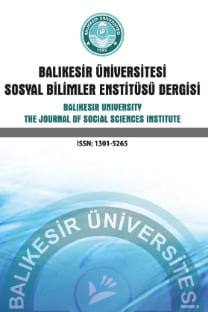ÇALIŞANLARIN ÖRGÜTSEL ADALET ALGILARINDA YÖNETİCİLERİNİN ETİK LİDERLİK DAVRANIŞLARININ ROLÜ
Araştırmanın amacı, yöneticilerin etik liderlik davranışları ile çalışanların örgütsel adalet algıları arasındaki ilişkiyi incelemek ve yöneticilerin etik liderlik davranışlarının çalışanların örgütsel adalet algıları üzerindeki rolünü belirlemektir. Yöneticilerin etik liderlik davranışları Etik Liderlik Ölçeği Brown, Trevino & Harrison, 2005 , çalışanların örgütsel adalet algıları ise Örgütsel Adalet Ölçeği Niehoff & Moorman, 1993 ile ölçülmüştür. LISREL 8.8’de gerçekleştirilen doğrulayıcı faktör analizi sonucunda, örgütsel adaletin üç, etik liderlik davranışının bir boyuttan oluştuğu doğrulanmıştır. Yöneticilerin etik liderlik davranışlarının örgütsel adaletin boyutları üzerinde etkisi olduğuna ilişkin geliştirilen yapısal eşitlik modelinin test edilmesiyle etik liderliğin dağıtım adaleti, prosedür adaleti ve etkileşim adaleti üzerinde etkili olduğu belirlenmiştir
Anahtar Kelimeler:
Etik Liderlik, Örgütsel Adalet, Dağıtım Adaleti, Prosedür Adaleti, Etkileşim Adaleti
The Role of Managers’ EthIcal LeadershIp BehavIours on OrganIzatIonal JustIce PerceptIon of Workers
The aim of the research is to investigate the relationship between managers’ ethical leadership behaviours and the organizational justice perception of workers and to identify the role of managers’ ethical leadership behaviours on organizational justice perception of workers. Managers’ ethical leadership behaviours was measured by Ethical Leadership Scale Brown et al., 2005 and organizational justice perception of workers was measured by Organizational Justice Scale Niehoff & Moorman, 1993 . After the result of comfirmatory factor analysis at LISREL 8.8, it is verified that organizational justice is composed with three dimensions and ethical leadership behaviour is composed with one dimesion. Testing the structural equation model about managers’ ethical behaviours’ influence on dimensions of organizational justice, it is realized that ethical leadership influences distributive justice, procedural justice and interactional justice
Keywords:
Ethical Leadership, Organizational Justice, Distributive Justice, Procedural Justice, Interactional Justice,
___
Anderson, J.C. ve Gerbing, D.W. (1988). Structural Equation Modeling in Practice: A Review and Recommended Two-Step Approach. Psychological Bulletin, 103(3), 411-423.Bies, R. (2001). Interactional (In)Justice: The Sacred and the Profane. Edited by: Greenberg, J. ve Cropanzano, R. Advances in Organizational Justice, Stanford University Pres., 89-118.
Brown, M.E., Trevino, L.K. ve Harrison, D.A. (2005). Ethical Leadership: A Social Learning Perspective for Construct Development and Testing. Organizational Behavior and Human Decision Processes, 97, 117-134.
Brown, M.E. ve Trevino, L.K. (2006). Ethical Leadership: A Review and Future Directions. The Leadership Quarterly, 17(6), 595-616.
Cohen, R.L. (1987). Distributive Justice: Theory and Research. Social Justice Research, 1(1), 19-40.
De Hoogh, A.H.B. ve Den Hartog, D.N. (2008). Ethical and Despotic Leadership, Relationships with Leader’s Social Responsibility, Top Management Team Effectiveness and Subordinates’ Optimism: A Multi-Method Study. The Leadership Quarterly, 19(3), 297-311.
Foley, S., Kidder, D.L. ve Powell, G.N. (2002). The Perceived Glass Ceiling and Justice Perceptions: An Investigation of Hispanic Law Associates. Journal of Management, 28(4), 471-496.
Folger, R. (1987). Distributive and Procedural Justice in the Workplace. Social Justice Research, 1(2), 143-159.
Folger, R. ve Cropanzano, R. (1998). Organizational Justice and Human Resource Management. London: Sage Publications Inc.
Freeman, R.E. ve Stewart, L. (2006). Developing Ethical Leadership. USA: Business Roundtable Institute for Corporate Ethics.
Greenberg, J. (2000), Promote Procedural Justice to Enhance Acceptance of Work Outcomes. Edited by: Locke, E.A., Handbook of Principles of Organizational Behavior, Blackwell Publishing, 181- 195.
Judeh, M. (2011). Ethical Decision Making and Its Relationship with Organizational Justice. International Journal of Academic Research, 3(4), 215-220.
Mendonca, M. (2001). Preparing for Ethical Leadership in Organizations. Canadian Journal of Administrative Sciences, 18(4), 266-276.
Thomas, T., Schermerhorn, J.R. ve Dienhart, J.W. (2004). Strategic Leadership of Ethical Behavior in Business. Academy of Management Executive, 18(2), 56-66.
Trevino, L.K. ve Brown, M.E. (2004). Managing to be Ethical: Debunking Five Business Ethics Myths. Academy of Management Executive, 18(2), 69-81.
Uğurlu, C.T. ve Üstüner, M. (2011). Öğretmenlerin Örgütsel Bağlılık Düzeylerine Yöneticilerinin Etik Liderlik ve Örgütsel Adalet Davranışlarının Etkisi. Hacettepe Üniversitesi Eğitim Fakültesi Dergisi, 26(41), 434-448.
Wouters, K. ve Maesschalck, J. (2011). Leadership Perceptions and Integrity-An Empirical Study. 2011 EGPA Annual Conference. (04.03.2012).
Yavuz, E. (2010). Kamu ve Özel Sektör Çalışanlarının Örgütsel Adalet Algılamaları Üzerine Bir Karşılaştırma Çalışması. Doğuş Üniversitesi Dergisi, 11(2), 302-312.
Zhu, W, May, D.R. ve Avolio, B.J. (2004). The Impact of Ethical Leadership Behavior on Employee Outcomes: The Roles of Psychological Empowerment and Authenticity. Journal of Leadership and Organizational Studies, 11(1), 16-26.
Zhu, W. (2008). The Effect of Leadership on Follower Moral Identity: The Mediating Role of Psychological Empowerment. Leadership Review, 8(2), 62-73.
Zhu, W., Avolio, B.J., Riggio, R.E. ve Sosik, J.J. (2011). The Effect of Authentic Transformational Leadership on Follower and Group Ethics. The Leadership Quarterly, 22(5), 801-817.
- ISSN: 1301-5265
- Yayın Aralığı: Yılda 2 Sayı
- Başlangıç: 1998
- Yayıncı: Balıkesir Üniversitesi Sosyal Bilimler Enstitüsü
Sayıdaki Diğer Makaleler
IMPACT OF THE SERVICE QUALITY OF TURKISH THERMAL HOTEL ENTERPRISES ON CUSTOMER LOYALTY
Oktay EMIR, Didem PAŞAOĞLU BAŞ
ÇAĞDAŞ TÜRK RESMİNDEN BİR ÖRNEĞİN İKONOLOJİK ÇÖZÜMLEMESİ
Çalışanların örgütsel adalet algılarında yöneticilerinin etik liderlik davranışlarının rolü
Erdem AKTAŞ, Osman Avşar KUGUN, Ediz GÜRIPEK
KREDİ TAHSİSİNDE RATİNG YÖNTEMİNİN SORUNLU KREDİYE ETKİSİ
Metin ATALAR, Nisa Kıymet ŞAHIN
MUHASEBE MESLEK MENSUPLARI ARASINDA YAŞANAN HAKSIZ REKABET ÜZERİNE BİR ARAŞTIRMA
Vesile ÖMÜRBEK, Tarık TÜRKOĞLU
Türkiye'de Gastronomi turizmi üzerine genel bir değerlendirme
Ülker Erdoğan ARACI, Turgay BUCAK
